In which the beleaguered reviewer attempts to make some headway into the mounds of CDs seeking reviews accumulating daily by providing quick hits on a few recordings at a time.
Joseph Daley Earth Tones Ensemble - "The Seven Deadly Sins"
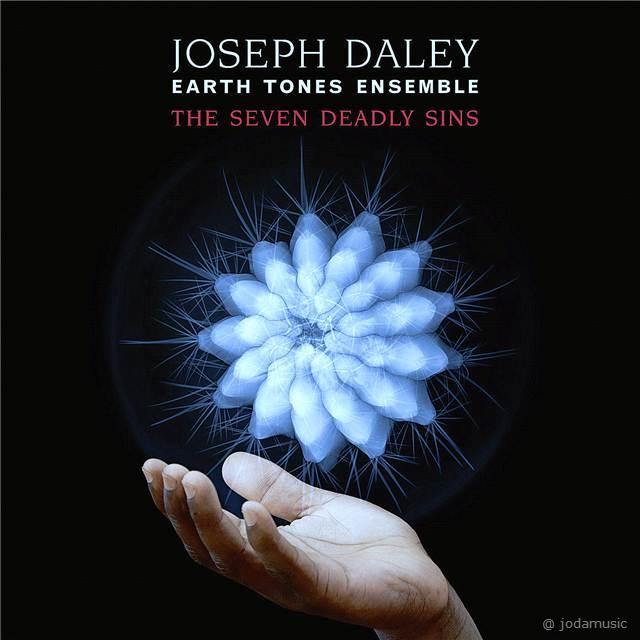 (JARO) The most interesting large ensemble recording I've heard yet this year, Joseph Daley's The Seven Deadly Sins features a first rate group, including players like Marty Ehrlich, Lew Soloff, Gary Valente, Satoshi Takeishi and Onaje Allan Gumbs performing Daley's richly harmonic compositions. A veteran of bands with Richard Muhal Abrams, Frank Foster, Charlie Haden, Sam Rivers, Gil Evans, Taj Mahal, Bill Cole and Carla Bley, and current member of the critically acclaimed group Hazmat Modine, Daley has taken elements from his mentors and created a highly original and personal work of his own that features intricate parts and lush harmonies. Besides composing and conducting the orchestra, Daley plays the euphonium and tuba. Adding to the low end, a plethora of other bass instruments--including bari sax, contrabass clarinet, bass saxophone, sarrusophone, contrabass sax, bass trombone, contrabass, French horns and several tubas, gives this group a unique deep, dark tonality that suits its name well. The seven deadly sins themselves are presented as a suite, with Warren Smith's vibraphone and marimba brightening up the powerhouse opening Latin-tinged track - "Invidia (Envy)," while "Aviarita (Avarice)" features Howard Johnson's lovely baritone saxophone contrasted with Gumbs' delicate piano. While "Gula (Gluttony)" features a wide range of amusingly lower-toned outbursts that may serve to remind of certain digestive bodily functions, "Pride" is a stately, vaguely Middle-Eastern-sounding number, with slippery counterpoint."Lechery (Lust)"--the longest of the sins at 12:21, adds a gaggle of Ellingtonian mocking trumpets hooting raucously, a frenetic piano solo by Gumbs and a solo (both arco as well as plucked) by bassist Benjamin F. Brown. "Anger" meanwhile sounds like a New Orleans street parade run amok, while the suite-ending "Sloth" is a lovely melody drifting through muddy waters. The album ends with the 23:36 "Ballade of the Fallen African Warrior," (written with obvious love for Daley's late brother Winston) that showcases many of Daley's superb composition talents in one continuous piece. This complex, yet utterly engaging piece is a colorful musical journey through strong themes and free form interludes to swinging sections (check out Gumbs' brilliant piano solo followed by Ehrlich on dazzling soprano), vibrant harmonic tapestries and compelling rhythmic undulations on a musical adventure that is well worth taking.
(JARO) The most interesting large ensemble recording I've heard yet this year, Joseph Daley's The Seven Deadly Sins features a first rate group, including players like Marty Ehrlich, Lew Soloff, Gary Valente, Satoshi Takeishi and Onaje Allan Gumbs performing Daley's richly harmonic compositions. A veteran of bands with Richard Muhal Abrams, Frank Foster, Charlie Haden, Sam Rivers, Gil Evans, Taj Mahal, Bill Cole and Carla Bley, and current member of the critically acclaimed group Hazmat Modine, Daley has taken elements from his mentors and created a highly original and personal work of his own that features intricate parts and lush harmonies. Besides composing and conducting the orchestra, Daley plays the euphonium and tuba. Adding to the low end, a plethora of other bass instruments--including bari sax, contrabass clarinet, bass saxophone, sarrusophone, contrabass sax, bass trombone, contrabass, French horns and several tubas, gives this group a unique deep, dark tonality that suits its name well. The seven deadly sins themselves are presented as a suite, with Warren Smith's vibraphone and marimba brightening up the powerhouse opening Latin-tinged track - "Invidia (Envy)," while "Aviarita (Avarice)" features Howard Johnson's lovely baritone saxophone contrasted with Gumbs' delicate piano. While "Gula (Gluttony)" features a wide range of amusingly lower-toned outbursts that may serve to remind of certain digestive bodily functions, "Pride" is a stately, vaguely Middle-Eastern-sounding number, with slippery counterpoint."Lechery (Lust)"--the longest of the sins at 12:21, adds a gaggle of Ellingtonian mocking trumpets hooting raucously, a frenetic piano solo by Gumbs and a solo (both arco as well as plucked) by bassist Benjamin F. Brown. "Anger" meanwhile sounds like a New Orleans street parade run amok, while the suite-ending "Sloth" is a lovely melody drifting through muddy waters. The album ends with the 23:36 "Ballade of the Fallen African Warrior," (written with obvious love for Daley's late brother Winston) that showcases many of Daley's superb composition talents in one continuous piece. This complex, yet utterly engaging piece is a colorful musical journey through strong themes and free form interludes to swinging sections (check out Gumbs' brilliant piano solo followed by Ehrlich on dazzling soprano), vibrant harmonic tapestries and compelling rhythmic undulations on a musical adventure that is well worth taking.
www.josephdaley.com
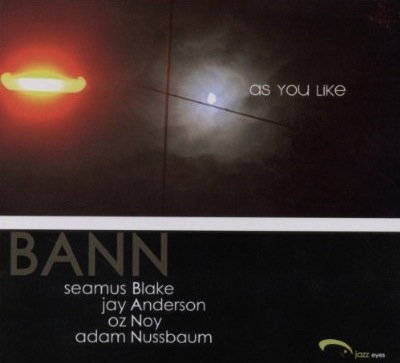 BANN - "As You Like"
BANN - "As You Like"
(Jazz Eyes)
This multi-generational quartet consists of veteran rhythm section members Jay Anderson and Adam Nussbaum (on bass and drums respectively) and young firebrands--guitarist Oz Noy and saxophonist Seamus Blake. With a pedigree like theirs--all are active members on the NYC scene--there is no questioning the talent, with the only question being can they work together well? Thankfully, the answer is a resounding "yes"--the result of the quartet having played together, primarily in Europe, for two years prior to the recording. As to be expected from their diverse backgrounds and wealth of experience performing across genres, the album is a freewheeling affair, with elements of jazz, funk, fusion and even country. "All the Things You Are" starts things off with a country twang before morphing into a high-stepping post-bop direction, complete with the talented young Blake's noteworthy shredding and Noy's organ-sounding guitar. The guitarist also supplies a slippery solo and merges sounds with Blake on sparkling unison lines. Monk's "Played Twice" is given a rock edge by Noy's distorted guitar, yet retains its breezy angular charm, thanks in part to Anderson's clever interjections on the bass. Perhaps the surprise of the recording is a version of the David Crosby (of the rock group Crosby, Stills, Nash & Young ) weeper "Guinnevere." I had my qualms before I heard it, but find myself charmed by this pleasing arrangement--heightened by Noy's electronic waves and seagulls--which restores this haunting melody to prominence. More strong music follows, as with Anderson's fun-as-all-get-out "Will Call," which gives the band a chance to cut loose. Nussbaum & wife supplies the mellow "Days of Old," while the band as a whole are credited with the funky title track. Noy shows his prowess with a wah-wah pedal on that number, while pulling out the lap slide on Anderson's country-ish (or is it Hawaiian?) "At Sundown." The guitarist also adds a spicy original ("Minor Shuffle") that mixes Grant Green swing with edgy fusion licks and a full-toned Blake solo. The band concludes this satisfying outing with a version of Joe Henderson's ever-popular "Isotope," and again Noy proves the difference-maker with his nasty electric guitar splashes and riffing. A pleasing debut from a promising foursome.
www.musiceyes.com/
Jane Ira Bloom - "Wingwalker"
 (Outline)
(Outline)
Soprano saxophonist Jane Ira Bloom has been active in jazz for 30 years as a performer, composer and educator. A Guggenheim fellowship award allowed Bloom the opportunity to compose nine of the ten songs on this disc which are performed by the artist with a strong group of longtime associates: keyboardist Dawn Clement, bassist Mark Helias and drummer Bobby Previte. Bloom is known for her full and clear tone on the notoriously squawky soprano sax, as well as her use of "space' in her writing, and both are prominently displayed her. Of course, as the first musician commissioned by NASA to create works involving space (she also has an asteroid named for her), Bloom's compositions often soar through the heavenly, especially when she adds electronics. But don't be deceived that her music is simply ethereal. Opener "Her Exacting Light" fits the pattern, true, but "Life on Cloud 8" (despite its title) features African rhythms supplied by Previte and some seriously powerful bass work by Helias, and Bloom's electronics get a bit edgy. Clement is the unsung heroine of the recording and she complements Bloom's lovely voice with subtle shadings of her own, as on the gorgeous duet "Ending Red Songs." The jaunty "Freud's Convertible" is a fun and swinging tune, while "Airspace" stops and starts and walks along with Bloom's altered sax cutting a swath of sound. "Frontiers in Science" lives up to its title, giving the entire band an opportunity to improvise, but within a solid framework, while the sultry "Rooftops Speak Dreams" features some of Bloom's most beautiful playing and impressive rhythmic counterpoint. Bloom's soprano sparkles like Benny Goodman's clarinet on "Rookie" and the band funks it up on the rousing "Live Sports," while "Adjusting to Midnight" is slow ballad. The title track highlights some of the most rewarding band interplay, as well as outstanding solos from Bloom, Helias and Clement. The album ends with a haunting solo saxophone version of "I Could Have Danced All Night" - the perfect ending to this solid outing from the talented Bloom. And, as an added bonus the CD also contains an mp3 file that merges sections from each of the tracks into one composition - not real sure of the purpose, but kind of cool anyway.
www.janeirabloom.com/
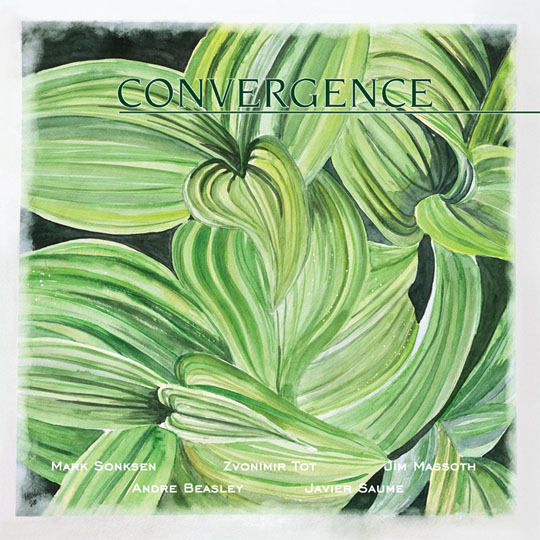 Mark Sonksen - "Convergence"
Mark Sonksen - "Convergence"
(Blauklang)
Mark Sonksen is an established luthier on the Chicago scene, but is also a fine player and composer three previous albums to his credit. Convergence is his latest and may be his best to date. Backed by a stellar crew, including Serbian-American guitar master Zvonomir Tot, underrated tenor saxophonist Jim Masssoth (also a much-in-demand recording engineer), talented drummer Andre Beasley and percussionist Javier Saume (on two tracks), Sonksen leads his combo through a strong set of straight-ahead (mostly) originals that wouldn't sound out of place on a '60's Blue Note session. Case in point is the opening title track where the entire band swings confidently through the changes. Tot plays an exciting solo in a Kenny Burrell-meets-Grant Green manner, but he plays it so smoothly that you don't notice the technique required to pull such artistry off. Meanwhile Massoth replies with a strong solo that hints at greats like Joe Henderson and Dexter Gordon. Sonksen follows with a first rate solo of his own that will have fans of solid no-frills, straight-ahead jazz licking their chops for what is to follow. And Sonksen and his band deliver the goods: "A Romance Revisited" is well-paced slow swinging ballad with a strong melody, and again featuring pleasing solos from Massoth, Tot and Sonksen. They slow things down even more with "Monday Evening Hymn" that recalls Ellington's gospel directions and gives Massoth and Tot a chance to caress the ear with graceful solo turns. Additionally Tot's comping here is outstanding, as it is throughout the rest of the album. I am certain that if this guitarist's educational duties were not so time-consuming, we would be hearing more about this incredible musician. Beasley too adds subtle yet interesting support on his kit. The uptempo "All in Due Time" has Sonksen walking his bass like he is competing in an Olympic walking race, while the band also takes on a Newfoundlandic folk song - "She's Like the Swallow (That Flies on High)" as a trio, with Masssoth sitting out, and its lovely melody and Sonksen's solid solo shine. "A Waltz for Mingus" is truly what it is intended to be and you can certainly hear the iconic bassist's influence in Sonksen's playing - especially the opening solo - on this bluesy waltz. The highly-effected fusion guitar solo by Tot should come as no surprise as Mingus was no stranger to working with electric guitarists such as Phillip Catherine and Larry Coryell later in his career. The delightful "Sailing With Joe" is a breezy island-tinged number with pleasantly surprising changes. Saume makes his first appearance here and immediately adds his magic touch to the sound. "A Leap of Faith" is another cheerful swinging piece, while Hugh Fraser's "Fairy Tales" is another lovely ballad with great work from Massoth. Meanwhile, the album ending "Eternal Questions" is a highlight of tight and energetic ensemble performance. This "convergence" of excellent playing and interesting, well-written compositions should bring Sonksen some well-deserved attention and will please fans of modern straight ahead jazz that is steeped in tradition.
www.marksonksen.com
Landon Knoblock & Jason Furman - "Gasoline Rainbow"
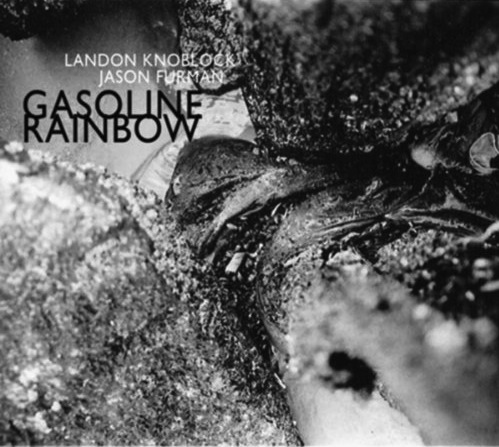 (Fractamodi Music) In March of 2009, I wandered into Pops for Champagne under the mistaken impression that bassist Kurt Schweitz' quartet was performing. Indeed Kurt was playing the bass, while his longtime saxophonist Phil Doyle was blowing hard, but two newcomers were there as well: a drummer and an incredible young pianist by the name of Landon Knoblock (you can see photos from and read all about this show here). Knoblock's interesting chord choices and rhythmic directions caught my ear at the time, so it is with great interest that I received his new release with drummer Jason Furman Gasoline Rainbow. Piano/drum duets are certainly not that common--although this the second time out for these two - and the success of such a venture will depend on the talent and compatibility of the players. In this case, it is clear that the two have been playing for several years together across several different styles, and their experiences (both shared and not) in R&B and rock come across through the music. The hilarious song titles like "Sensors Make Heroes" and "Decoy Trout," are quite apt for the nature of the songs. In this case, the former exudes humor and swings somehow despite Knoblock's angular paths and Furman's aggressive drumming. Meanwhile, the latter features Knoblock darting like a school of fish across his keys. The title track is an absolutely stunning composition that merges classical piano with a primal drum undercurrent. "Snowball Earth" hangs in the air with Furman's techno beat gradually joining Knoblock's lonely satellite ping. "Twinkle, Twinkle Alien Ocean" takes an unearthly course, but this time the atmosphere must be made of acid. Three short pieces ("Downbeasts 1-3") follow and are packed with interesting ideas, as is the machine-like rhythm driven "Katie's Solar Explosion and Cosmic Aftermath." The balance between the piano and drums here, as elsewhere on the recording, is unusual in that the drums usually seem to follow and complement the piano in most cases, whereas, here there is a sense of equality and a sense that the two are reacting to each other. "Love Goodnight" is about as close as the duo get to performing a ballad and the sensitive osmosis achieved is quite satisfying. The album ends with their longest track - the energetic 13:55-long "Tasty After Dinner Jazz Mint," which showcases the duo's ability to play off one another to the maximum.
(Fractamodi Music) In March of 2009, I wandered into Pops for Champagne under the mistaken impression that bassist Kurt Schweitz' quartet was performing. Indeed Kurt was playing the bass, while his longtime saxophonist Phil Doyle was blowing hard, but two newcomers were there as well: a drummer and an incredible young pianist by the name of Landon Knoblock (you can see photos from and read all about this show here). Knoblock's interesting chord choices and rhythmic directions caught my ear at the time, so it is with great interest that I received his new release with drummer Jason Furman Gasoline Rainbow. Piano/drum duets are certainly not that common--although this the second time out for these two - and the success of such a venture will depend on the talent and compatibility of the players. In this case, it is clear that the two have been playing for several years together across several different styles, and their experiences (both shared and not) in R&B and rock come across through the music. The hilarious song titles like "Sensors Make Heroes" and "Decoy Trout," are quite apt for the nature of the songs. In this case, the former exudes humor and swings somehow despite Knoblock's angular paths and Furman's aggressive drumming. Meanwhile, the latter features Knoblock darting like a school of fish across his keys. The title track is an absolutely stunning composition that merges classical piano with a primal drum undercurrent. "Snowball Earth" hangs in the air with Furman's techno beat gradually joining Knoblock's lonely satellite ping. "Twinkle, Twinkle Alien Ocean" takes an unearthly course, but this time the atmosphere must be made of acid. Three short pieces ("Downbeasts 1-3") follow and are packed with interesting ideas, as is the machine-like rhythm driven "Katie's Solar Explosion and Cosmic Aftermath." The balance between the piano and drums here, as elsewhere on the recording, is unusual in that the drums usually seem to follow and complement the piano in most cases, whereas, here there is a sense of equality and a sense that the two are reacting to each other. "Love Goodnight" is about as close as the duo get to performing a ballad and the sensitive osmosis achieved is quite satisfying. The album ends with their longest track - the energetic 13:55-long "Tasty After Dinner Jazz Mint," which showcases the duo's ability to play off one another to the maximum.
www.fractamodi.com
 Ben Wolfe Quintet - "Live at Smalls"
Ben Wolfe Quintet - "Live at Smalls"
(Smalls Live)
Bassist Ben Wolfe is best known for his work with Wynton Marsalis, Diana Krall and Harry Connick, Jr. His latest release is another of the "Live at Smalls" releases that showcase an artist live at that New York City jazz club. On this outing, Wolfe is joined by saxophonist Marcus Strickland, drummer Gregory Hutchinson, pianist Luis Perdomo and trumpeter Ryan Kisor. This top-notch quartet sizzles on their way through a set of nine Wolfe originals, and the warm recording captures the atmosphere of an evening in the club well, with audience noise and applause occasionally seeping into the mix. They come out firing on all cylinders on the burning "Block 11" - a number driven by Hutchinson, Perdomo and Wolfe's hard charging bass, and featuring a couple of false endings. Kisor and Strickland provide excellent solos, and Perdomo - perhaps best known for his long association with Miguel Zenon - is always worth he price of admission. "For the Great Sonny Clark" is a big swinging tune that is a true highlight -sounding like something out of an old Blue Note session. Wolfe's strong compositional talents are grounded in the traditional, but contain enough modern surprises to satisfy modern jazz listeners, and hopefully this live recording will bring him some much deserved attention. "Telescope" is another case in point - with great swinging bass and a classic hard bop feel, while the complex "Contraption" shows Wolfe's more modern inclinations, with Hutchinson's explosive propulsion and Kisor's stratospheric solo the highlights. The fun continues through the rest of the album, with "Unjust" showcasing Wolfe and Strickland, and the saxophonist and Perdomo shining on the gentle ballad "I'll Know You More." The quirky, but interesting "Double Czech" staggers along with Wolfe and Perdomo taking center stage, while a Wolfe solo opens up "Coleman's Cab." An unusual 1:01 piece of bass and drums ("The Trade") inexplicably ends the album on an odd note, but the combination of solid and memorable compositions, a surfeit of formidable solos and cohesive band performance, along with the intimate club atmosphere make this a winning record.
www.benwolfe.com
Roxy Coss
 Saxophonist/flautist Roxy Coss is one of the bright young stars in the NYC jazz world, performing with groups like the DIVA Jazz Orchestra and Smoke Big Band, she also leads her own quintet. On her self-titled debut, she shows she is a force to be reckoned with, both as a player, as well as, a composer. Opening track, "The Wandering Ones" is a graceful, gently swinging waltz with Coss taking an assured solo. She is joined by trumpet/flugelhorn player Kate Miller and pianist Justin Kauflin, bassist Kellen Harrison and drummer Shawn Baltazor on this surprisingly mature and satisfying track. Kauflin switches to Fender Rhodes and lays down some tasty, sensitive and shimmering notes on the laid-back groove of "Lately" and Coss swings with a full round tone on her tenor. Coss' appreciable talent on the flute is demonstrated fully on the Herbie Mann-ish cha-cha "A New Time," with a nice solo spot by Kuflin on acoustic piano working well with Coss' vibrant, yet round flute tones. "Enlightenment" is a gospel-flavored slow ballad, reminiscent of Coltrane, with Miller adding lush layers of harmony. Guitarist Ryan Brennan makes an appearance on the relaxed, yet funky "The Slow Ascent," while Coss and Miller play a pleasantly bluesy call-and-response. "The Cherry on the Top" brings back Coss' flute on a tune that displays her ability to write in a traditional swinging manner. Harrison takes a nice solo here, while Baltazor contributes some slinky brush work on the skins. Cross pulls out her soprano sax for the gloomy, piano-less "I Think So," and shows that she can create a glossy timbre on this instrument as well. Harrison's teetering bass lines and Baltazor's rumbling drums and sizzling cymbals make for a vaguely unsettling experience, but the album ends on a happy note, with the advent of "July." This track brings back guitarist Brennan on a bouncy track that could have slid into Spyro Gyra territory, but for the shifting tempos and deep chord waters the band wades into, which make this one of the strongest tracks on the album. Her tenor solo here is bright and powerful and makes one long for the recording to continue to hear more from the talented player.
Saxophonist/flautist Roxy Coss is one of the bright young stars in the NYC jazz world, performing with groups like the DIVA Jazz Orchestra and Smoke Big Band, she also leads her own quintet. On her self-titled debut, she shows she is a force to be reckoned with, both as a player, as well as, a composer. Opening track, "The Wandering Ones" is a graceful, gently swinging waltz with Coss taking an assured solo. She is joined by trumpet/flugelhorn player Kate Miller and pianist Justin Kauflin, bassist Kellen Harrison and drummer Shawn Baltazor on this surprisingly mature and satisfying track. Kauflin switches to Fender Rhodes and lays down some tasty, sensitive and shimmering notes on the laid-back groove of "Lately" and Coss swings with a full round tone on her tenor. Coss' appreciable talent on the flute is demonstrated fully on the Herbie Mann-ish cha-cha "A New Time," with a nice solo spot by Kuflin on acoustic piano working well with Coss' vibrant, yet round flute tones. "Enlightenment" is a gospel-flavored slow ballad, reminiscent of Coltrane, with Miller adding lush layers of harmony. Guitarist Ryan Brennan makes an appearance on the relaxed, yet funky "The Slow Ascent," while Coss and Miller play a pleasantly bluesy call-and-response. "The Cherry on the Top" brings back Coss' flute on a tune that displays her ability to write in a traditional swinging manner. Harrison takes a nice solo here, while Baltazor contributes some slinky brush work on the skins. Cross pulls out her soprano sax for the gloomy, piano-less "I Think So," and shows that she can create a glossy timbre on this instrument as well. Harrison's teetering bass lines and Baltazor's rumbling drums and sizzling cymbals make for a vaguely unsettling experience, but the album ends on a happy note, with the advent of "July." This track brings back guitarist Brennan on a bouncy track that could have slid into Spyro Gyra territory, but for the shifting tempos and deep chord waters the band wades into, which make this one of the strongest tracks on the album. Her tenor solo here is bright and powerful and makes one long for the recording to continue to hear more from the talented player.
www.roxycoss.com
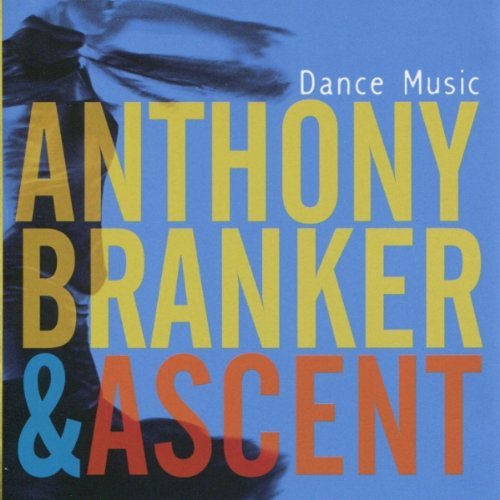 Anthony Branker & Ascent - "Dance Music"
Anthony Branker & Ascent - "Dance Music"
(Origin)
Director of Jazz Studies at Princeton University, Dr. Anthony Branker has a stated goal of combining music with dance, and to that end created the Ascent music collective, which currently features such well-known players as Ralph Bowen (tenor & soprano sax), Tia Fuller (alto sax) and Adam Cruz (drums). Despite the qualms one may have with the idea of dance music in jazz (after all bop and later bebop was a reaction to the big band dance music), the album title is a bit misleading: the music on here is often light but sophisticated modern jazz with great solos. The catchy "The Renewal" starts off with great piano drive by Jonny King and fiery work by the under-appreciated Bowen, trombonist Clifford Adams Jr., King and the ascendant Fuller. "Mysterious Ways" introduces vocalist/lyricist Kadri Voorand, but even this is not "dance music" but rather a sultry ballad with nice soprano work by Bowen. The title track would be hard pressed to dance to as well with its off-kilter, yet funky rhythms--nice work by Cruz and bassist Kenny Davis and Fuller show their stuff. "A Smile Awaits" waltzes nicely and features King, Bowen and Davis, while "Asking Answers" brings back Voorand on a bright and light, almost-pop number, with Fuller and Bowen trading licks. "The House of the Brotherhood of the Black Heads" is a fast paced burner, and again Fuller and Bowen supply the heat, along with Adams King and Cruz. Another slow waltz - "The Holy Innocent" features Voorand again, as does the bouncy "A Beautiful Life." The group is joined by guitarist Freddie Bryant on mellow "Truth," - a nice change of pace - and the album ends with the upbeat Latin dance number "Depende" - perhaps the only true "dance" number on the album. A tasty and fun recording.
www.anthonybranker.com
Renee Manning - "All Grown Up"
 Singer Renee Manning has had an interesting career. Beginning as a classical soprano, she sang funk and soul and jazz standards before her pregnancy caused her voice to lower an octave and a fifth, forcing the vocalist to begin again, this time as a contralto. She became the longest tenured vocalist to perform with the Mel Lewis Orchestra(1983-89) and has since appeared with people like Jon Faddis, Dizzy Gillespie, Sir Roland Hanna, Don Cherry, Lester Bowie, and big bands including Chico O'Farrill's Afro Cuban Orchestra and the Mingus Big Band. Her dark, blues-inflected delivery has garnered acclaim from ciritics like Stanley Crouch and Ira Gitler, and as she shows on her third release, All Grown Up, the kudos are warranted. Although best known perhaps as a big band singer, this record primarily focuses on Manning in duets or trios, with just four of the 14 songs fleshed out with drums and horns. The intimate setting allows Manning's black molasses-flavored voice to be heard clearly. On te opening track, "My Baby Just Cares for Me," Manning is only accompanied by Ron Jackson on guitar and Andy McKee on bass, yet the track swings hard and Manning shows some tasty scatting skills. A satisfying take on "Skylark" features the singer in a duet with the talented John DiMartino on piano, while Manning shows her compositional talents on "The Only Thing You Need (Is Me)" - one of five originals included that was penned by the singer herself. Here the slightly Caribbean-feel is enhanced by percussionist Victor See Yuen McKee's funky bass and Jackson's chiming guitar, while flugelhorn player Kenny Rampton's tasteful lines add to the relaxed atmosphere. The rest of the album is an eclectic mixture: a bluesy version of Mingus' "Baby Take a Chance;" a Motown-styled original ("I Am"); Al Jarreau and Earl Klugh's gentle "(A Rhyme) This Time;" another Hoagy Carmichael duet - this time with guitarist Jackson ("Nearness of You"); a bass and wordless vocal duet ("Me, Myself and Andy"); the Grammy Award-winning Chaka Khan and Bruce Hornsby gospel-flavored song "Love Me Still;" a guitar/bass trio version the old time "Yes Sir, That's My Baby;" the sultry Mexican pop song "Sabor Ami;" a haunting guitar and voice rendition of Jon Lucien's "I'll Be Loving You;" and two more originals: the tough, funked-up "Wow" and the hip, bluesy "kiss-off" song "Never Miss a Good Thing" (with Rampton on muted trumpet and Earl McIntyre on bluesy bass trombone). Throughout it all, Manning shows an ability to shine in several styles, but boy does she jump out at you on the latter tune, exhibiting a real talent for the blues. An enjoyable record by a singer with an appealing voice.
Singer Renee Manning has had an interesting career. Beginning as a classical soprano, she sang funk and soul and jazz standards before her pregnancy caused her voice to lower an octave and a fifth, forcing the vocalist to begin again, this time as a contralto. She became the longest tenured vocalist to perform with the Mel Lewis Orchestra(1983-89) and has since appeared with people like Jon Faddis, Dizzy Gillespie, Sir Roland Hanna, Don Cherry, Lester Bowie, and big bands including Chico O'Farrill's Afro Cuban Orchestra and the Mingus Big Band. Her dark, blues-inflected delivery has garnered acclaim from ciritics like Stanley Crouch and Ira Gitler, and as she shows on her third release, All Grown Up, the kudos are warranted. Although best known perhaps as a big band singer, this record primarily focuses on Manning in duets or trios, with just four of the 14 songs fleshed out with drums and horns. The intimate setting allows Manning's black molasses-flavored voice to be heard clearly. On te opening track, "My Baby Just Cares for Me," Manning is only accompanied by Ron Jackson on guitar and Andy McKee on bass, yet the track swings hard and Manning shows some tasty scatting skills. A satisfying take on "Skylark" features the singer in a duet with the talented John DiMartino on piano, while Manning shows her compositional talents on "The Only Thing You Need (Is Me)" - one of five originals included that was penned by the singer herself. Here the slightly Caribbean-feel is enhanced by percussionist Victor See Yuen McKee's funky bass and Jackson's chiming guitar, while flugelhorn player Kenny Rampton's tasteful lines add to the relaxed atmosphere. The rest of the album is an eclectic mixture: a bluesy version of Mingus' "Baby Take a Chance;" a Motown-styled original ("I Am"); Al Jarreau and Earl Klugh's gentle "(A Rhyme) This Time;" another Hoagy Carmichael duet - this time with guitarist Jackson ("Nearness of You"); a bass and wordless vocal duet ("Me, Myself and Andy"); the Grammy Award-winning Chaka Khan and Bruce Hornsby gospel-flavored song "Love Me Still;" a guitar/bass trio version the old time "Yes Sir, That's My Baby;" the sultry Mexican pop song "Sabor Ami;" a haunting guitar and voice rendition of Jon Lucien's "I'll Be Loving You;" and two more originals: the tough, funked-up "Wow" and the hip, bluesy "kiss-off" song "Never Miss a Good Thing" (with Rampton on muted trumpet and Earl McIntyre on bluesy bass trombone). Throughout it all, Manning shows an ability to shine in several styles, but boy does she jump out at you on the latter tune, exhibiting a real talent for the blues. An enjoyable record by a singer with an appealing voice.
http://www.reneemanning.com/
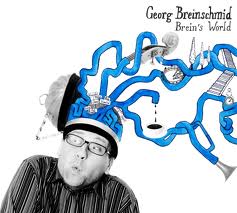 Georg Breinschmid - "Brein's World"
Georg Breinschmid - "Brein's World"
(Preisser Records)
At times goofy, at times inventive, full of classical music references, waltzing Old Viennese songs, gypsy music, jazz, blues, folk and even rap, this immense double CD release from bassist Georg Breinshmid is a maddening, yet ultimately rewarding journey through the mind of the Austrian classical/jazz double bassist. With bizarre artwork and liner notes running in all directions in at least two languages (not to mention a running time totaling more than 150 minutes) , the recording is a reviewer's nightmare. I admit that after hearing the first two tracks, which are performed with his Alpine folk music trio Brein's Cafe, I wasn't sure what I was hearing and put what I thought was another gypsy jazz recording aside. The opening track ("7/8 Landler") sounds like a slap happy Slam Stewart meeting Django and Stephane's Hot Club, in 7, mind you, while "Musette #2" would make Johann Strauss proud. Things get nutty on "Jacaranda" - a duet with trumpeter Thomas Gansch with a bit of a New Orleans flavor and excellent improvisation. As he shows here and throughout, the bassist was a highly-trained classical musician before jumping in to jazz with his technique fully intact. But just when you are getting somewhat settled, Breinschmid sets down his bass and sings in German in a childlike duet with pianist Frantisek Janoska, which espouses the joys of computers and email, I think (I'm really not making this up). This strange landscape continues with the funky (with celtic fiddle and impressive bass solo) "Brein's Knights," the Brazilian-flavored "Quartier Latin," Franz Liszt's "Liebestraum," and another track with Brein singing and whistling along to accordion and mandolin on a truly wacky song about being an airplane terrorist who uses his bathroom supplies (shampoo and lotion) to kill ("Flugzeugderorist"). But all is not unserious, "Intermezzo" again finds the bassist in a jazzy duet with Gansch on flugelhorn, while "5/4" and "Bach 11/16" are lovely classical-influenced pieces. The rapping, shrieking, belching and kazoo of Erni M on "Tschukkn Belle" should by now come as no surprise and we aren't even finished with the first disc - there is another full blown waltz and a track with Brein whistling to a plucked chordal accompaniment on a bass guitar. Are you getting the idea yet? Yes the man is insane, but in a good way. The second CD is more of the same, with the the lovely "Without Me" (with Thomas Vobler on vibes and Daniel Schnyder's soprano sax), the silly voice rap on the groove heavy "Schnucki von Heanois" (about an unstoppable stalker girlfriend) that will have you in stitches, the '60s-flavored "Oldtime Hit" (that will have you doing the frug or watusi), a 5/4 blues ("Blues Five") and plenty more silly singing, whistling, funky grooves and old school waltzes and gypsy touches to keep a listener quite amused. And watch for the false ending on the last song that leads to some crude commentary that ends this crazy recording well.
www.georgbreinschmidcom
